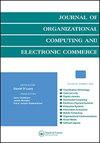LES MISÉRABLES: The Tale of COVID-19 and Role of Information
IF 1.9
4区 管理学
Q3 COMPUTER SCIENCE, INFORMATION SYSTEMS
Journal of Organizational Computing and Electronic Commerce
Pub Date : 2021-04-03
DOI:10.1080/10919392.2021.1904093
引用次数: 3
Abstract
ABSTRACT As researchers, scientists, and the general public strive to understand and manage COVID-19, many people search the internet for clues that might help them understand and react to the virus in an informed manner. Social media has become a primary source of news for many, but it can also be a hindrance in managing crisis situations due to the prevalence of fake news. This paper reports on a survey administered to social media users during the first wave of the pandemic to identify perceptions and areas of conflict that influenced society’s ability to understand and contain the pandemic. Applying conflict resolution theory to the survey results enabled us to identify major issues related to the management of COVID-19, from which we made recommendations for the roles that information systems research can play in handling future pandemics or other crises. The recommendations are divided into the two general categories of media trust and crisis containment.LES MISÉRABLES: COVID-19的故事和信息的作用
随着研究人员、科学家和公众努力了解和管理COVID-19,许多人在互联网上搜索线索,以帮助他们以知情的方式了解和应对病毒。社交媒体已成为许多人的主要新闻来源,但由于假新闻的盛行,社交媒体也可能成为管理危机局势的障碍。本文报告了在大流行第一波期间对社交媒体用户进行的一项调查,以确定影响社会理解和控制大流行能力的观念和冲突领域。将冲突解决理论应用于调查结果,使我们能够确定与COVID-19管理相关的主要问题,并据此提出信息系统研究在处理未来大流行或其他危机中可以发挥的作用的建议。这些建议分为信任媒体和遏制危机两大类。
本文章由计算机程序翻译,如有差异,请以英文原文为准。
求助全文
约1分钟内获得全文
求助全文
来源期刊

Journal of Organizational Computing and Electronic Commerce
工程技术-计算机:跨学科应用
CiteScore
5.80
自引率
17.20%
发文量
7
审稿时长
>12 weeks
期刊介绍:
The aim of the Journal of Organizational Computing and Electronic Commerce (JOCEC) is to publish quality, fresh, and innovative work that will make a difference for future research and practice rather than focusing on well-established research areas.
JOCEC publishes original research that explores the relationships between computer/communication technology and the design, operations, and performance of organizations. This includes implications of the technologies for organizational structure and dynamics, technological advances to keep pace with changes of organizations and their environments, emerging technological possibilities for improving organizational performance, and the many facets of electronic business.
Theoretical, experimental, survey, and design science research are all welcome and might look at:
• E-commerce
• Collaborative commerce
• Interorganizational systems
• Enterprise systems
• Supply chain technologies
• Computer-supported cooperative work
• Computer-aided coordination
• Economics of organizational computing
• Technologies for organizational learning
• Behavioral aspects of organizational computing.
 求助内容:
求助内容: 应助结果提醒方式:
应助结果提醒方式:


